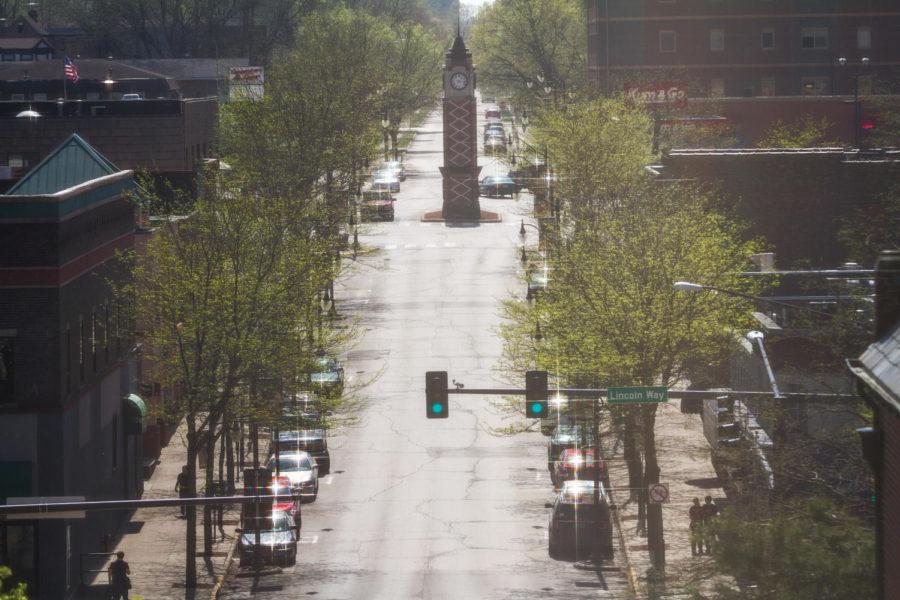Campustown redevelopment to occur in bits and pieces
June 21, 2012
An area filled with bars, students and a few small businesses, Campustown has been through the rounds of redevelopment plans, oftentimes falling through with problems of high property taxes and high turnover of businesses and services it offers.
Lack of parking, one of the biggest problems Campustown has encountered, is expected to subside with the addition of the new intermodal facility on Hayward Avenue.
“Our hope is that the intermodal facility will have a ripple effect in terms of private enterprise activity, and when those things tend to happen, they not infrequently knock on the city door,” said Ames mayor Ann Campbell.
Warren Madden, ISU vice president of business and finance, speculated the facility would be a catalyst for redevelopment.
“One of the possibilities, I think, is that, with the intermodal facility on the west edge of the core of Campustown, maybe we’ll start to see some redevelopment of the buildings that are across the street,” Madden said.
The intermodal facility is expected to help bring in business that originally was unavailable due to the legalities of lack of parking.
“I think it’s going to look better because of the parking,” said Tor Finseth, an executive member of Campustown Action Association. “We have a code, an ordinance that, if you’re going to have a restaurant, a housing facility [for rent], anything like that, you have to have a certain number of parking spaces. We almost have too much density because you need a lot of space to put a restaurant. If you’re going to have an Applebee’s or an Olive Garden, the problem is finding parking.”
People in the community, including ISU students and graduates, have given their two cents’ worth on what they feel needs to be done to make Campustown a place for everyone. A common perspective is the type of businesses Campustown has to offer.
“I think it’s safe to say that there’s an interest in getting kinds of business that are not just student businesses, [ones] that would generate a more stable business year-round,” Campbell said.
Iowa State’s Government of the Student Body has conducted multiple surveys to determine what students want to see happen to Campustown. Finseth, a former GSB member and ISU alumnus, helped GSB conduct those surveys in 2010 and 2011, which asked students for input on Campustown and what they’d like to see done.
“We had somewhere like 800 responses,” Finseth said. “We found a small percentage wanted more bars. It was the minority. The majority of people wanted more restaurants and more shopping. A lot of the responses we got … wanted things for people under 18. They wanted entertainment outside of drinking.”
Attempts have been made in the past to revitalize and redevelop Campustown, the most recent being by LANE4 Property Group, a real estate developer based out of Kansas City, Mo.
Madden said LANE4 had developed a vision for how they would redo Campustown, focusing on the intersection of Lincoln Way and Welch Avenue, which is seen by many as the heart of Campustown.
“We interviewed a number of firms [at the time], and they were the one selected,” Madden said. “Unfortunately as presses began to move along, the economy did what it did in 2008 to 2010 and so business expansion and development slowed down, which I think was one of the problems.”
Lane4’s plan was to come in and buy up all the properties in Campustown, develop them and lease them. The ground floor in each building would be retail while the upper floors would serve as office space for the university.
One of the bigger problems that LANE4 faced with Campustown was the high property tax rate, due to its proximity to campus. The rental rate the group was asking was $20 to 24 per square foot, twice the normal rate for the Campustown area, Madden said. The group was also negotiating with the city of Ames for tax abatement programs.
“Their economic model and the cost they were proposing ended up with rental rates that we felt initially were way too high,” Madden said. “They finally came down some on their cost but they weren’t willing to be committed to do more than just this one building on the corner, and as we got to that point, the university wasn’t willing to move ahead on being a tenant in the building if [LANE4 wasn’t] willing to commit to do more than that one structure.”
In the summer of 2011, the agreement between the university and LANE4 lapsed, thus ending its era within Campustown.
Now, the idea is to redevelop Campustown in “bits and pieces” over a longer period of time, working on the façade and services.
“There are always little things that can be done toward making the façade nicer, doing more architectural work,” Finseth said. “I don’t know if any mainstream restaurants are going to come anytime soon. We’ve always talked about it, but that will be something that we’ll have to cross our fingers for.”
A primary goal of the Campustown Action Association is to improve the overall atmosphere of the area so it will have more opportunities of attracting longer lasting businesses, thereby decreasing the high turnover rate in Campustown.
“It will greatly improve a lot of the services we offer here,” Finseth said. “It will hopefully attract a lot more businesses here, a lot of business startups in the next year or two. I don’t want to get rid of all the bars by any means, but we do have a lot of bars here. What you will probably see is a lot of the business owners talking to the companies and actually replacing some of the bars.”







